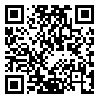Volume 7, Issue 3 (2016)
LRR 2016, 7(3): 223-243 |
Back to browse issues page
1- Associate Professor of Linguistics, University of Bvlysyna, Hamedan, Iran
2- Ph.D. student in linguistics, Bu Ali Sina University, Hamedan, Iran
2- Ph.D. student in linguistics, Bu Ali Sina University, Hamedan, Iran
Abstract: (5116 Views)
Modality is a grammatical feature which plays a crucial role in determining the ultimate interpretation of propositions. Different languages make use of different linguistic elements like mood, modal auxiliaries, modal verbs, modal adjectives and adverbs for encoding the concept of modality. Despite of its importance in the overall structure of any language, little attention has been paid to the study of modality in Iranian Languages. The present paper focuses on the analysis of the modal auxiliaries in Hawrami. After taking a short look at the concept of modality and getting familiar with the Palmer's (1999, 2001) basic classification of modal systems, these three modals are introduced:"mašjo/mašjā: must", "biey:become", "tāwāy: can". It is argued that among the other modals, only "mašjo" is used to denote the degree of "necessity" in both "epistemic" and "deontic" modal systems. "biey" and "tāwāy", on the other hand, exhibit the concept of "possibility" in "epistemic" and "deontic" systems. Moreover, "biey" and "tāwāy" encode different types of dynamic modality. Although "biey" can also be used to indicate "necessity" in deontic system as well, it imposes less severe obligations on the agent compared to the deontic "mašjo". It is also shown that "mašjā" is the only modal verb which can convey the "deontic" reading in the past tense constructions. None of the aforementioned modal auxiliaries encode evidentiality in Hawrami. Key Words: modal auxiliaries, epistemic modality, deontic modality, dynamic modality, Hawrami.
Published: 2016/07/22
| Rights and permissions | |
 |
This work is licensed under a Creative Commons Attribution-NonCommercial 4.0 International License. |

